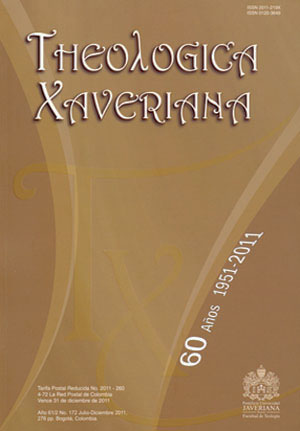Abstract
This article strives to synthetically examine the topic of “envying others’ grace”, understood as a sin against the Holy Spirit. To understand the meaning and importance of this topic, some previous theological considerations are presented, followed by theological reflections supported by ecclesial tradition – with the special reference to Saint Thomas Aquinas. The conclusions we offer allow to acknowledge that this topic points out to –although vicariously the nature of Christian event and its reasoning, as well as to the nature of the ecclesial communion and its unity. Thus, this is a topic related to fundamental theology, which can receive useful insight from this reflection.
This journal is registered under a Creative Commons Attribution 4.0 International Public License. Thus, this work may be reproduced, distributed, and publicly shared in digital format, as long as the names of the authors and Pontificia Universidad Javeriana are acknowledged. Others are allowed to quote, adapt, transform, auto-archive, republish, and create based on this material, for any purpose (even commercial ones), provided the authorship is duly acknowledged, a link to the original work is provided, and it is specified if changes have been made. Pontificia Universidad Javeriana does not hold the rights of published works and the authors are solely responsible for the contents of their works; they keep the moral, intellectual, privacy, and publicity rights.
Approving the intervention of the work (review, copy-editing, translation, layout) and the following outreach, are granted through an use license and not through an assignment of rights. This means the journal and Pontificia Universidad Javeriana cannot be held responsible for any ethical malpractice by the authors. As a consequence of the protection granted by the use license, the journal is not required to publish recantations or modify information already published, unless the errata stems from the editorial management process. Publishing contents in this journal does not generate royalties for contributors.


